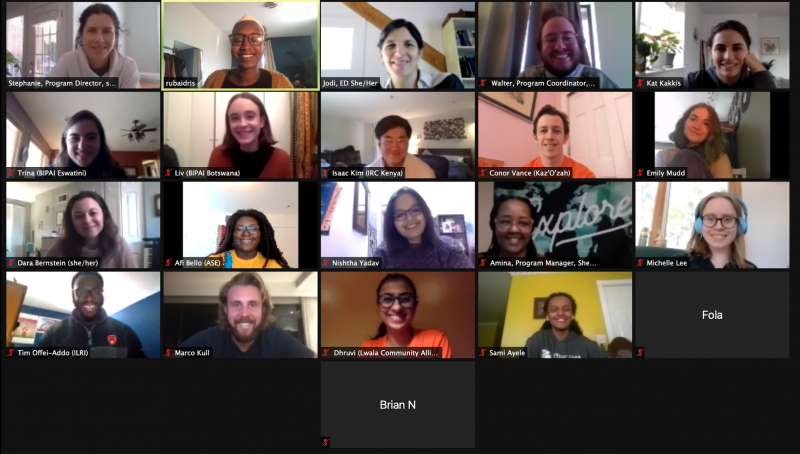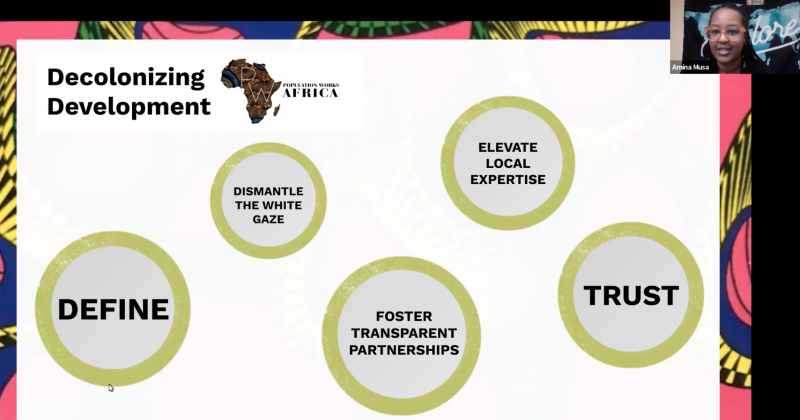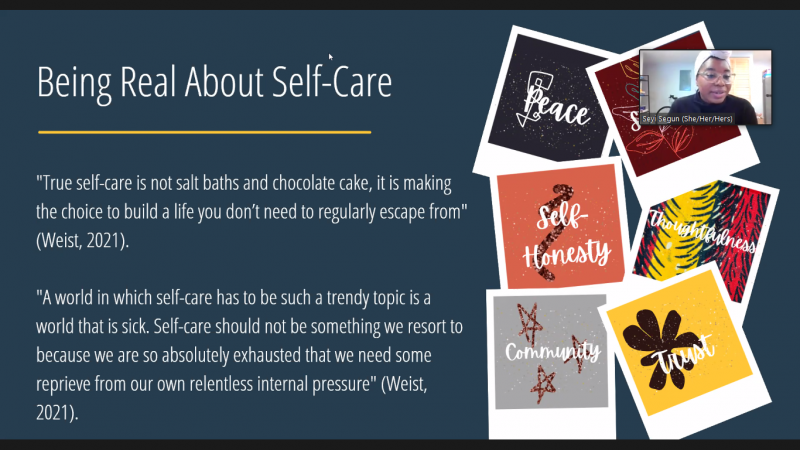March/April 2021
Dear Friends,
We hope that this publication of the Fellows’ Flyer finds you and your family well.
This year, we held our very first Virtual Mid-Year Retreat on March 4th & 5th. While it was disappointing that our 16 amazing Fellows did not have the opportunity to meet in person on the continent, we are grateful to them, the alumni, and the speakers who made the retreat a success nonetheless.
During the two-day event, Fellows engaged in various breakout sessions that covered a multitude of topics, from professional development and identity dynamics to mental health. This virtual format also allowed for more alumni and speakers to participate in a way that would not have been possible with an onsite orientation. The Fellows also had an opportunity to reconnect with one another and with the staff.
As our Fellows enter the second half of their fellowships, PiAf has begun placements for the upcoming year, and hope to have the next cohort finalized by May, which is very exciting! We’re currently gearing up for our orientation in June and cannot believe how fast time has flown. We look forward to welcoming our new cohort, and we continue to be in awe of how amazing the current 2020-2021 fellowship class has been.
Thank you to all of the alumni, donors, and friends who continue to offer support to the Fellows and host organizations, and we look forward to seeing what the next couple of months will bring.
Warm regards,
Jodi & the PiAf Staff
PiAf Connections
Please click below to check out pictures of our Fellows, Alums and other members of the PiAf family meeting up at home and around Africa.
Notes from the Field
By Tim Offei-Ado, '2020-2021' Fellow with the International Livestock Research Institute in Kenya
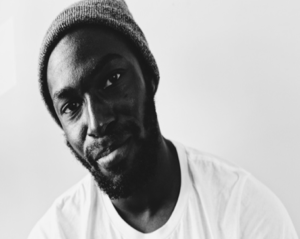
My name is Tim Offei-Addo and I am currently a Fellow at International Livestock Research Institute (ILRI) working with the Communications and Knowledge Management team. As an agricultural research organization, ILRI’s mission is to support agriculture activities throughout the global south, with robust scientific research and training programs.
Hosting and producing a podcast on the other side of the world isn’t exactly what I envisioned for my fellowship year. But hey here I am, learning a set of new skills and appreciating the mentorship that I’m gaining from my colleagues at ILRI. It’s been fascinating sitting on the communications team and talking to scientists in different disciplines for my podcast, The Boma. Last week I interviewed Hung-Nguyen Viet, an ILRI scientist, who went to Wuhan as a part of the World Health Organization’s trip to find the origins of the virus. I wasn’t on my A-game during the interview, but Hung was, and he made some fascinating comments on the Lab Leak theory and the proposed next steps to visit the south of China and trace the origins of possible host animals.
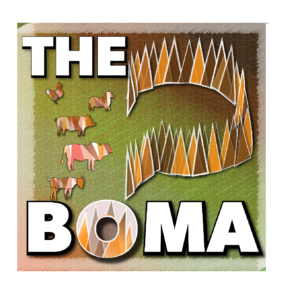
The Artwork for The Boma, an ILRI Podcast hosted by Tim Offei-Addo
Currently, I’m working on a climate change series. Sitting in my bedroom outside of Boston, I’m keenly aware of the anti-livestock movement that argues we need to eat less meat to curb greenhouse gas emissions. It’s a fair solution and one that might have to be employed in parts of the world.
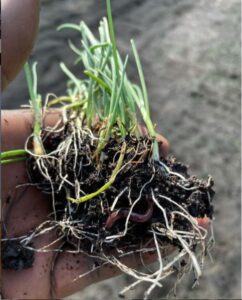
An Earthworm wrapped up in the roots of some healthy Onion Seedlings
As I interview researchers working on issues related to climate change, they all note that it’s extremely important to pause and refocus our lens: instead of asking, how will livestock impact climate change?, we should ask, how will climate change impact livestock and livestock farmers? Focusing on how we can help people adapt to climate change could help decrease all those greenhouse gasses the experts are always talking about. For now, I’m just ruminating, but as I pull quotes from the different interviews I’ve conducted and assemble the series, I’m sure to find data to back these thoughts up.
When I’m not thinking about podcasts, I’m farming. While not ideal, the remote nature of the fellowship has allowed me to deepen my love for food, community, and culture through the work in my ever-expanding garden. As a Ghanaian, I have a specific food culture that isn’t catered to by local farmers in Massachusetts. Consequently, I’m growing staples of our West African diet, like hot peppers, garden eggs, tomatoes, onions, and okra, and sharing them with the immigrant populations in my community.
Notes from the Field
By Brian Njoroge, '2020-2021' Fellow with Kupona Foundation in Tanzania
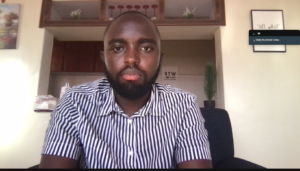
During one of our numerous daily Zoom meetings
How time flies when you are having fun– or in this case, doing something you like. I cannot believe that 8 months have passed since starting my fellowship. While the ‘commute’ from my bedroom to my workstation has been unexciting, my time at Kupona Foundation has not.
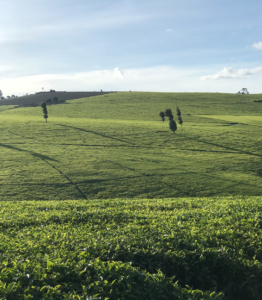
Tigoni Tea Farms, A 20-minute drive from home where I occasionally go to watch the sunset
One of the reasons I applied to the Princeton in Africa Fellowship was to gain more on-the-ground experience in the international development space. While moving in-country has been made impossible due to COVID-19, I have definitely learned more about the sector through my role. The learning has been compounded by working in the global health sector during a pandemic. As a Communications and Partnerships Officer, I handle most external communications and drive partnerships that amplify our impact in Tanzania. I have particularly enjoyed being on calls with current and potential partners as we try to seek alignment in our work. This process has got me thinking a lot about the impact that nonprofits have and how this can be made sustainable. Strategic partnerships ensure the scalability and longevity of most non-profits’ work – and this is currently being made possible by multi-sectoral collaboration across the government, civil societies, and the private sector. Kupona
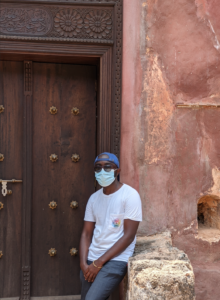
Maximizing a 3-day weekend by making an impromptu trip to the coast
exemplifies this partnership model really well, which occasionally leads to a multitude of challenges and complexities, but it eventually provides answers to the problems we seek to solve. As the question of what to do next after the fellowship becomes more common, I intend to prioritize sustainable development work that is rooted in these multi-sectoral collaborations.
PiAf promises access to a network of brilliant Fellows and alumni who are passionate about making a change in Africa, which was another reason I applied for the fellowship. Even though I am yet to physically meet most of the Fellows, I am constantly in awe of the brilliance that my cohort holds, continually shaping my Fellowship experience. Additionally, having a great mentor as well as PiAf alumni who are always willing to jump on calls with you, introduce you to someone or go for a hike together in Nairobi has been amazing. Looking back to the application question on why I was interested in the fellowship, I am glad some of my reasons are being checked off.
Notes from the Field
By Dara Bernstein, '2020-2021' Fellow the WARC Group in Sierra Leone
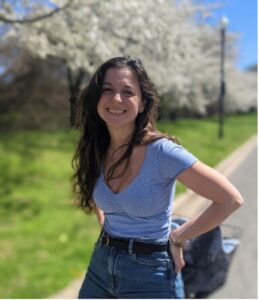
Biking around DC’s idyllic Hains Point to see cherry blossoms in peak bloom
Greetings from Washington, DC., where I’m completing my Princeton in Africa fellowship! I’ve been working with the West African Rice Company (Warc) Group, a small firm with agricultural production and consulting operations in Sierra Leone and Ghana, as a Monitoring & Evaluation Specialist. Over the past eight months, I’ve contributed to internal monitoring & evaluation activities that seek to measure the impact of our services on our smallholder farmer clients’ livelihoods, as well as external consultancies evaluating
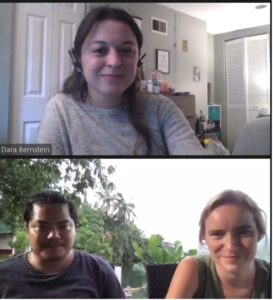
Living vicariously through my Accra-based Warc colleagues, who called into a meeting from the beach!
agricultural programs. Aside from the Zoom fatigue, working virtually hasn’t been too big of a challenge for me, though I hope to meet my wonderful colleagues and visit Warc’s training farms in person someday!
While I started my fellowship with two years of experience evaluating international development programs, I knew very little about agriculture and food security. Through my work, I’ve connected to people with decades of experience in the agriculture sector and have learned a ton about agricultural technology and food security innovations. Learning about the impactful food security work Warc and similar organizations are carrying out has been inspirational and has motivated me to continue working in the sector. My fellowship has reinforced my passion for program evaluation, which is not only an excellent means of helping organizations like Warc improve their operations, but also an opportunity for me to grow and learn from people with much more lived experience than myself. I have learned so much already!
Outside of work hours, I love practicing yoga and spending time outdoors to decompress. I’m so grateful for WhatsApp, through which I’ve been able to maintain close contact with my colleagues and co-Fellows located all over the world. I’ve also enjoyed virtual meetings with previous Fellows, who have been so willing to share their impressive and inspiring experiences. It’s a privilege to be part of the PiAf community and I’m very excited to see what the last four months of my fellowship have in store!
Notes from the Field
By Sami Ayele, '2020-2021' Fellow with the African Leadership Academy in South Africa
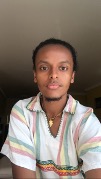
A selfie a day keeps the doctor away
Hello PiAf family! Eight months into my Fellowship at the African Leadership Academy, I can say my responsibilities and tasks haven’t stayed the same from week to week. Change has been the overarching theme this year and it stands true both in and out of my work. A lot of this change was only feasible because of the opportunity to work remotely from my home in Seattle.
The African Leadership Academy (ALA) is a two-year secondary institution in Johannesburg, South Africa. In addition to its course offerings and student programs, ALA has developed robust arms in entrepreneurial support and professional industry communities to develop relationships with alumni, employer partners, and other strategic stakeholders. My responsibilities have ranged from analyzing newsletter engagement across our network to organizing the annual Carnival, the last touchpoint for graduating seniors to gain critical information about immigration, university support, and more.
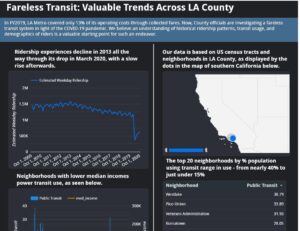
Preview of my project dashboard
I’m also happy to gain new experiences for professional growth outside of work. I completed a data science bootcamp in February where I finished a project on LA County’s metro system with 3 teammates. Learning Python for the first time was equal parts thrilling and challenging, especially when it came to practicing how to call certain data segments over and over. It was especially exciting because I joined a new community of over 500 people, all working to transition or better themselves in the tech space.
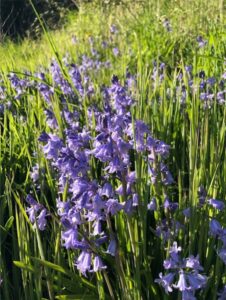
Flowers from a nearby park
Overall, this year “synchronized” many little experiences into a year-long chain of events that continues to expand. The conversations I’ve had over WhatsApp, LinkedIn, email, and phone about the ever-mysterious future show not only how supportive complete strangers can be, but also that possibilities are endless given the right circumstances. In the spirit of Little Fires Everywhere, I didn’t make good choices – I had good choices. I know the work at ALA is meant to provide those same good choices to their students, one program and opportunity at a time.


